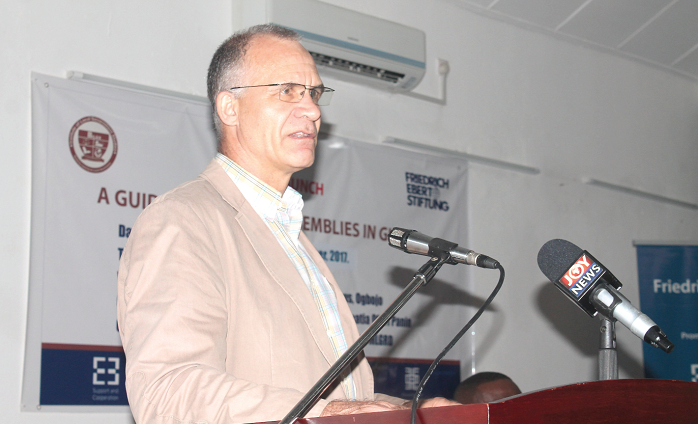
Effective communication: important tool in decentralisation process
The Resident Director of Friedrich Ebert Stiftung (FES), Mr Fritz Kopsieker, has observed that effective communication is an important tool in the decentralisation process in the country.
Advertisement
He also attributed the unsuccessful participation in governance at the local level to the lack of accountability and political interference in the work of district assemblies.
According to him, “the rights and responsibilities between the local and national governance must be clearly defined. The division should be defined so that they can work together because local government is an important vehicle to guide the development of a nation.”
Event
Mr Kopsieker was speaking at the launch of the second edition of a book on district assemblies in Accra.
The 108-page book, ‘A guide to District Assemblies in Ghana,’ is a collaboration between the Institute of Local Government Studies (ILGS) and the FES.
The guide captures the significant developments in the local government system for local government actors and the citizenry.
It also identifies various actors and the roles they play in ensuring effective democracy.

The book also presents a history of decentralisation and local government, structure of the local government system, standing orders of district assembly, legal basis and standard processes and a summary of code of conduct and etiquette of officers in the local government sector.
Challenges
Mr Kopsieker further observed that, “one major challenge of the system is the general lack of understanding, attraction and participation in local governance. Considering the centrality of citizen participation in local government administration, it becomes critical to provide adequate knowledge and tools for easy meaningful engagement in local affairs.”
He also expressed worry over the issue of cleanliness in various communities in the country and entreated the people to make the “National Sanitation Day programme an everyday exercise.’’
The director was hopeful that the book would provide relevant knowledge for citizens and also serve as a reference material for policymakers, academics, politicians, development partners and stakeholders in local governance.
Commendation
A Deputy Minister of Local Government and Rural Development, Mr Osei Bonsu Amoah, commended the ILGS and FES for coming out with such material on local governance.
‘’I am interested in participatory governance at the local level because this will include the marginalised. Though ACT 936 is significant in local governance, the book will serve as a concise and handy document for stakeholders,’’ he said.
The minister hinted that his outfit was preparing new modules on standing orders for district assemblies on simplified guidelines on procurement, financial management, public-private arrangement and the general administration of the assemblies.
He added that the book would be an additional literature to help the ministry execute its mandate responsibly.
The Deputy Director of ILGS, Dr Abdulai Darimani, said the composition of unit committees and other structures aimed at improving the financial muscles of metropolitan, municipal and district assemblies were in process.
‘’A careful reading of the book shows it was inspired by new developments and a collective resolve to provide up-to-date information on the subject of decentralisation and the local governance system in Ghana,’’ he added.
Significance
For his part, the Dean of Graduate Studies and Research of the ILGS, Dr Eric Oduro Osae, said the institute was inspired by the realisation that the book would provide people with the right information as required by law, adding that it would prepare and sensitise people to accept the position by the government to elect district chief executives (DCEs).



